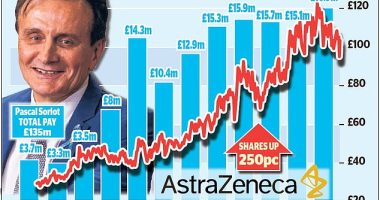
When it comes to active managers, there are few better known than Terry Smith and Nick Train.
The stockpickers have built a reputation over decades, delivering attractive returns to investors in the Fundsmith and Lindsell Train funds. Their global equity funds have in particular become a popular option for Isas.
The two managers look for ‘high-quality’ companies, meaning businesses that are established, post reliable profits and should be largely immune from economic shocks.
Over the long term, both managers have delivered strong returns but that’s not to say the funds are identical. Smith holds two thirds of Fundsmith Equity in US shares, while Lindsell Train’s global equity fund holds just over a third.
We look at how the managers’ global equity funds have performed and some UK-focused options for investors wanting to add more high-quality funds to their portfolio.


Time to bag a bargain? UK funds might be unfashionable but they could offer attractive returns
How have Fundsmith and Lindsell Train fared this year?
High inflation has ushered in a new economic regime, providing both opportunity and volatility for investors.
Global markets have remained resilient however, with the MSCI World Index up 19 per cent year to date, a sharp contrast to the -17.7 per cent it returned in 2022.
A decline in US inflation, combined with renewed interest in artificial intelligence pushing tech stocks higher, has also helped markets. The S&P 500 is up 18.06 per cent year to date while the Nasdaq has gained 35 per cent.
Both Fundsmith and Lindsell Train’s global equity funds have benefited from the rally in technology stocks this year.
Fundsmith’s top contributor from January to July 2023 has been Meta. In a letter to shareholders, Smith noted that while fund price performance is often the primary focus, he remains focused on the fundamental performance of the companies.
‘The past six months have seen a slowdown in revenue growth from our technology companies, a resilient performance from our healthcare stocks and continued pressure on the profitability of our consumer businesses.
‘To sum up, conditions are tougher and our companies are mostly having to cope with slower revenue growth and/or higher input costs. However, that’s what happens from time to time so we are mostly sanguine about it.’
Lindsell Train’s global equity fund, which is co-managed by Train, James Bullock and Michael Lindsell, has a higher proportion of the portfolio held in the UK.
Its most recent factsheet shows 35.5 per cent is invested in the US, followed closely by 30.3 per cent in the UK and 21.3 per cent in Japan.
Like Smith, Train has benefited from the strong rally among US technology names, with PayPal and Intuit up 12 per cent and 11 per cent in July alone.
Co-manager Bullock said: ‘Whilst we haven’t owned any of the obvious mega-cap tech winners, like Nvidia (which has more than trebled this year), there are several less obvious beneficiaries that can credibly claim to harness AI’s power to enhance their own products and services but haven’t (yet?) experienced the extreme market-dominating returns.’
Can the UK market offer similar returns?
Smith and Train have built names for themselves by identifying strong companies and delivering long-term returns. This can be applied to the UK stock market too, even if it’s unfashionable at the moment.


Stockpicker Nick Train looks to invest in high quality companies
AJ Bell’s head of investment analysis Laith Khalaf warns that the performance of UK funds in recent years has been dismal.
The platform’s own data shows that even a top quartile UK fund would have failed to beat a bottom quartile global fund over the last 10 years.
The average UK active fund has returned 74.3 per cent over the last decade, compared to 155.3 per cent from the average active global fund and 239.4 per cent from the average active US fund.
‘Many of the best performing UK funds of the last decade either exclusively or predominantly invest in medium and smaller companies, even so none can hold a candle to the returns provided by Fundsmith Equity.
‘However the future doesn’t necessarily look like the past, and investors would do well to retain some allocation to the UK stock market in their portfolios, especially because the performance differential between global and UK funds has probably naturally re-weighted their portfolios in favour of the former.
‘The strong performance of global funds has also in part been driven by a clutch of technology names which sit at the top of the S&P 500, and a reversal in fortunes for these stocks could see the tables turned.’
Indeed, the UK market remains cheap in plenty of experts’ eyes which means it can be a great place to look if you’re wanting to bolster your portfolio.
These types of funds will differ from Fundsmith and Lindsell Train, given the UK market is very different from the wider global market.
The FTSE All-Share trades on 9x earnings while the global market is on 20x. This is largely due to the UK having a higher exposure to energy, banks and mining rather than technology stocks which dominate in the US.
Owen Freshwater, investment manager at Evelyn Partners said: ‘Despite this, there are many high quality UK-listed businesses that trade on attractive valuations. Various fund managers utilise a similar quality process to Fundsmith and Lindsell Train to identify these companies and have delivered strong returns for investors through market cycles.’


Active manager Terry Smith founded Fundsmith in 2010
Train himself runs Lindsell Train’s UK equity fund which, despite a rocky few years, has returned 15.85 per cent in the year to 30 June 2023.
Its exposure to defensive consumer companies, as well as financial and industrial companies has helped the fund steer the course.
Freshwater adds: ‘Given the higher quality nature of the portfolio, the portfolio trades on a P/E multiple more similar to the global market than the UK, but for this investors gain exposure to a faster growing and more resilient set of companies.
‘This approach has delivered performance that has consistently outperformed UK peers. Investors should be aware of a handful of companies that are listed in other markets (e.g., Heineken and Mondelez).’
Can any UK funds replicate Smith and Train’s success?
While Smith and Train’s strategies can’t be replicated entirely, there are some funds that follow a similar approach of investing in companies with strong fundamentals.
Freshwater highlights Evenlode Income which identifies businesses with strong economic moats, strong balance sheets and high cash flow generation.
‘This approach leads to similar exposure to Lindsell Train, with high exposure to defensive consumer businesses (also hold Diageo) and industrials (Experian).
‘The portfolio has greater stock diversification with closer to 40 names, and also contains a few overseas stocks. Given the dividend growth target, investors also get a yield pickup with a typical annual payout of 2.5-3 per cent.’
Alex Watts, investment analyst at Interactive Investor highlights Royal London Sustainable Leaders, led by Mike Fox. The fund seeks to invest in predominantly UK-listed companies, particularly those looking to support the transition to a low carbon economy.
While it has less exposure to consumer businesses, it has large holdings in financials, industrials and healthcare.
‘Over five and 10 years, the absolute and risk-adjusted performance of the fund is strong, outperforming both peer funds and benchmark. The fund has derived impressive returns from the aforementioned overweight industrials and healthcare sectors.
‘As a UK Equities offering on II’s ACE 40 (under the Core category), the fund may suit investors seeking to sustainably navigate the UK market.’









